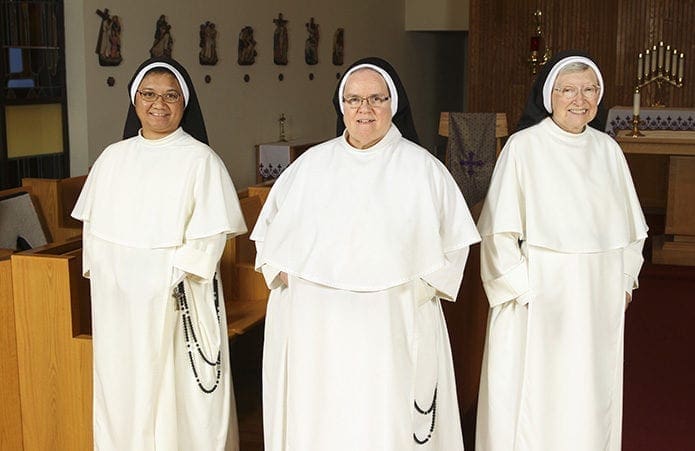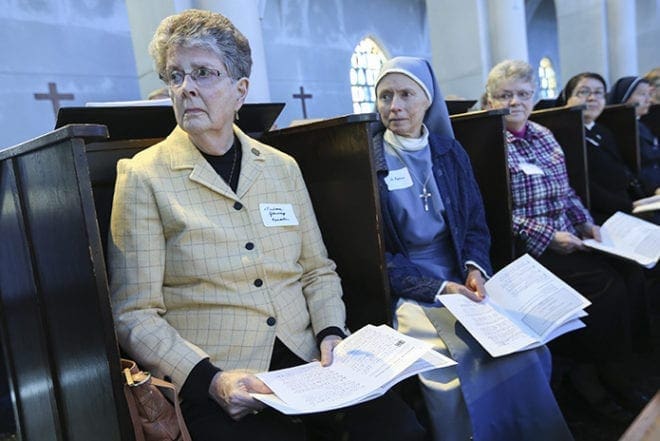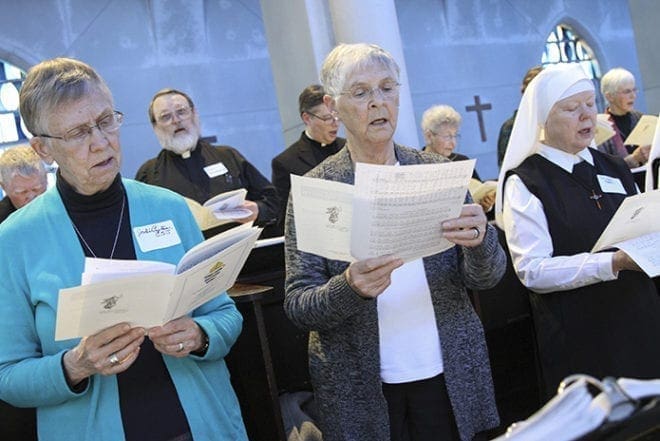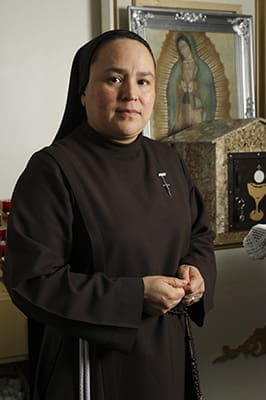 Photo By Michael Alexander
Photo By Michael AlexanderAtlanta
Through lives of devoted service, sisters bring the faith to the people
By PRISCILLA GREEAR, Special to the Bulletin | Published March 9, 2018
ATLANTA—For 20 years Hawthorne Dominican Sister Miriam Smith has quietly provided free palliative care and a listening ear at Our Lady of Perpetual Help Home to those dying of cancer, where typically less than 5 percent of the patients are Catholic. Over at Emory Saint Joseph’s Hospital, founded by Sisters of Mercy in 1880, Sister Peggy Fannon, RSM, has nursed critically ill patients for 45 years with Mercy compassion and dedication. Along Atlanta’s Buford Highway, Sister Miriam Mendoza, RFR, has strengthened the faith foundation over the past year at the blossoming Hispanic Christ the King Mission, starting with the 300 children in religious education. And in Hoschton, Cenacle Sisters Susan Arcaro and Barbara Young have guided seekers from around the South to find friendship with God through spiritual direction, retreats and faith enrichment for some 25 years.
For decades strong, intelligent, capable and constant religious sisters in the Archdiocese of Atlanta and across the nation have run schools and hospitals, established parish ministries, provided spiritual guidance and cared for the marginalized, building the church foundation outside of the ecclesial spotlight. The ranks of women religious have steadily declined from their mid-20th-century heyday, and in some instances they worked themselves out of jobs by training the laity.

Cenacle Sisters Barbara Young, far left, and Susan Arcaro, third from left, take part in a Feb. 6 prayer service at the Monastery of the Holy Spirit, Conyers, observing consecrated life. The duo has been conducting their retreat and faith formation ministry in the Atlanta Archdiocese for 25 years. This is also the 125th anniversary of their religious order. Photo By Michael Alexander
Now a core group of sisters continues to leaven the church of Atlanta with God’s love and compassion, and they believe that vocations will continue to evolve as God desires.
At St. Catherine of Siena School in Kennesaw, the principal Sister Mary Jacinta and three other Dominican Sisters of St. Cecilia inspire children and adults alike to live completely for Christ through their joyful Christian witness of poverty, chastity and obedience.
“The biggest thing is the witness to the value of giving one’s life totally to the Lord and the reality of the vocation to religious life that God truly and clearly calls certain men and women to dedicate their lives to him totally with the desire to serve God’s people,” said Sister Mary Jacinta, 42. “God is worth it enough for someone to give his or her life to him. And that speaks to the reality that at the end of the day for every human person, whether you are a father or mother or single, our ultimate fulfillment is in nobody except the Lord. He’s worth everything.”
In conjunction with Women’s History Month, National Catholic Sisters Week takes place March 8-14, and the Archdiocese of Atlanta will kick off a year to honor religious life and celebrate this vocation in schools and parishes.
“We want young people to realize that a religious vocation is a wonderful thing to have. Our focus is to get religious life smack out in front of people,” said Sister Margaret McAnoy, IHM, vicar for religious. “Being an IHM has been the most fulfilling life I can imagine. I have lived on the words, ‘come follow me,’ and have been willing to be a disciple.”
An invitation to explore a “vibrant life”
Having served as a Sister, Servants of the Immaculate Heart of Mary for 66 years, Sister Margaret, 84, currently oversees about 85 sisters in active ministry in the archdiocese, representing about 18 orders of women. While there are more choices for women today, “It’s still a vibrant life to explore and we will look to be doing more of this throughout the year,” said Sister Margaret. “I continue to see the benefits or fruits of our labors in parishes and schools and we still are a gift to the church. And even though our numbers are diminished, it doesn’t mean we are any less effective.”
Religious have always put faith in action, but now they’re more vocal about it, she said.
“In the last 30 or 40 years we’ve branched out into missionary work, peace and justice issues, we’re pretty much international, and sisters are seeking out places where the Gospel needs to be preached,” continued Sister Margaret. “And I think you’re going to find sisters in every network group in D.C. that lobbies Congress.”
Growing up in Michigan, Sister Margaret was taught by IHM sisters and followed her own older sister’s path. First coming to Atlanta to teach at St. Pius X High School, she later served as Cursillo director, on the archdiocese’s spiritual development staff, in ministry to men with AIDS at the Shrine of the Immaculate Conception and to patients as a chaplain.
She enjoys close religious companionship, returning “home” to the motherhouse regularly in Michigan.
“We’re just doing God’s work, and we’re happy about it … We all have different calls, but it’s how we live out that call and live the mission,” she emphasized.
A call to ease suffering
Celebrating her 50th jubilee next year, Sister Miriam Smith discerned her call to the Dominican Sisters of Hawthorne, New York, after she volunteered in high school at their home in Philadelphia and felt drawn to “their goodness and kindness in working with the sick.”
She serves at Atlanta’s Our Lady of Perpetual Help Home, founded in 1939, which currently has 26 cancer patients from diverse backgrounds and is supported by its auxiliary.
“We’re just so fortunate through divine providence and generosity of people here that we’re able to run a free home for patients and to be able to give them comfort and whatever we can give them until the Lord takes them home,” said Sister Miriam, the director.
The sisters begin each morning with Mass in the chapel.

(L-r) Sisters of St. Joseph Jodie Creten and Helen Mick, and Eudist Servants of the Eleventh Hour Sister Mary Francis Power take part in a Feb. 6 prayer service at the Monastery of the Holy Spirit, Conyers, observing consecrated life. Photo By Michael Alexander
“What they see in the sisters each day helps them to go through their suffering. Really through the grace of God we’re able to go out and work with our patients daily for comfort, just to be there and listen to them,” she said. “And it’s not a sad place to be, everyone that comes here already knows their diagnosis. Here they’re coming for palliative care, for us to care for them, and really to find peace.”
Also caring for the suffering, Sister Mary Priniski, OP, Ph.D., has raised consciousness of the rights of workers and the poor for decades. She now serves on the board of Emory University’s Aquinas Center of Theology and as project coordinator of Gathering for Mission, which engages church leadership on Pope Francis’s vision of a church of and for the poor.
“Most of my ministry has been engaging, helping to have people who are poor and on the margins in society have their voice heard,” said Sister Mary.
Celebrating her 50th jubilee, the Adrian Dominican was first inspired back in the early 1970s by a social justice synod in Rome, which affirmed that action on behalf of justice is a constitutive element of the Gospel.
“If you’re open to hearing the Spirit wherever you find it—which as the pope says is not only within the church but beyond—your life is very full and it’s been an amazing 50 years,” she said. “Those of us who are members of religious congregations have tremendous opportunities to respond to the needs of the people of God … You don’t have those (family) responsibilities so we’re free to do those things to speak truth to power, we’re freer to accept the consequences of standing up to those who are suffering.”
Doing the work that needs to be done
Sister Mary was attracted to the Adrian Dominicans’ joyful spirit. “It’s not like you never think that there was another life out there you could have lived, but you just continue to have to choose,” she said. “When I was in my late 20s you think ‘do I want children? If I do I better leave now.’ But no, this has been a platform for me to do the work I need to do and live the life I need to live.”
Sister Mary and others view the post-World War II vocations boom as an anomaly where her class of 35 was considered small.

Franciscan Sisters of Our Lady of Refuge Miriam Mendoza has served as the director of religious education for adults and children at the Cathedral of Christ the King Hispanic Mission, Atlanta, since 2016. Sister Miriam, a native of Guadalajara, Mexico, joined her order in 1999. Photo By Michael Alexander
“The needs in the future are going to be different so the face of religious life is going to be different and it may not be as institutional,” she said, wearing blue jeans in the original Dominican tradition to dress like simple women. “We still have hermits, but we don’t have as many. Then it went to monastics. We still have monastics, but there are not as many. So the face of religious life has changed over the centuries.”
Along the way many congregations established schools, hospitals and social service agencies.
“In a time when women weren’t in leadership very much in the secular world, we were presidents of universities, CEOs of hospitals and we helped enable that kind of presence in the church because you’re called to do something,” Sister Mary said. “Today there are more opportunities in secular society and the church to provide that kind of leadership, and women religious support that.”
With all those opportunities, Sister Miriam Mendoza resisted her own vocation as a Franciscan Sister of Our Lady of Refuge. As she finished her nursing degree in Jalisco, Mexico, she never planned to minister in the United States or become a religious for that matter—planning to attend medical school, marry her boyfriend and have six children.
But as she prayed weekly before the Blessed Sacrament, she eventually decided with fear and excitement to begin a discernment process and ultimately to give herself totally to God as a Franciscan—against her father’s wishes. She first worked in Jalisco for over a decade in a hospital before answering a call to work in Atlanta. At Christ the King Mission she now directs religious education for 300 children along with RCIA and adult and youth formation in the rapidly growing mission. All the while she’s trying to learn English to be a better advocate for immigrants and to plan a health fair for the many who neglect self-care or lack resources. And while she doesn’t have six children of her own, “there are many spiritual ones.”
“It hasn’t been easy, life has ups and down, but I’ve had great satisfaction, feel content and fulfilled in what God is asking me to do day by day. He never leaves me alone, is always with me,” reflected the cheerful Franciscan. “I never thought I’d work in missions other than health care. I worked many years in physical health and now it’s my turn to work in spiritual health. It’s a greater challenge.”